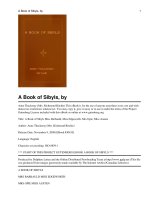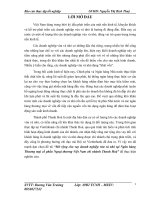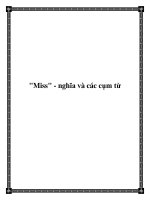Miss mackenzie
Bạn đang xem bản rút gọn của tài liệu. Xem và tải ngay bản đầy đủ của tài liệu tại đây (1.37 MB, 379 trang )
TheProjectGutenbergeBook,MissMackenzie,byAnthonyTrollope
ThiseBookisfortheuseofanyoneanywhereatnocostandwith
almostnorestrictionswhatsoever.Youmaycopyit,giveitawayor
re-useitunderthetermsoftheProjectGutenbergLicenseincluded
withthiseBookoronlineatwww.gutenberg.org
Title:MissMackenzie
Author:AnthonyTrollope
ReleaseDate:December28,2007[eBook#24000]
Mostrecentlyupdated:October15,2018
Language:English
Charactersetencoding:ISO-8859-1
***START OF
MACKENZIE***
THE
PROJECT
GUTENBERG
E-textpreparedbyJosephE.Loewenstein,M.D.
EBOOK
MISS
MISSMACKENZIE
by
ANTHONYTROLLOPE
Firstpublishedinbookformin1865
CONTENTS
I. TheMackenzieFamily
II. MissMackenzieGoestoLittlebath
III. MissMackenzie'sFirstAcquaintances
IV. MissMackenzieCommencesHerCareer
V. ShowingHowMrRubb,Junior,ProgressedatLittlebath
VI. MissMackenzieGoestotheCedars
VII. MissMackenzieLeavestheCedars
VIII. MrsTomMackenzie'sDinnerParty
IX. MissMackenzie'sPhilosophy
X. PlenaryAbsolutions
XI. MissToddEntertainsSomeFriendsatTea
XII. MrsStumfoldInterferes
XIII. MrMaguire'sCourtship
XIV. TomMackenzie'sBed-Side
XV. TheTearingoftheVerses
XVI. LadyBall'sGrievance
XVII. MrSlow'sChambers
XVIII. Tribulation
XIX. ShowingHowTwoofMissMackenzie'sLoversBehaved
XX. ShowingHowtheThirdLoverBehaved
XXI. MrMaguireGoestoLondononBusiness
XXII. StillattheCedars
XXIII. TheLodgingsofMrsBuggins,NéeProtheroe
XXIV. TheLittleStoryoftheLionandtheLamb
XXV. LadyBallinArundelStreet
XXVI. MrsMackenzieofCavendishSquare
XXVII. TheNegroSoldiers'OrphanBazaar
XXVIII. ShowingHowtheLionWasStungbytheWasp
XXIX. AFriendinNeedIsaFriendIndeed
XXX. Conclusion
CHAPTERI
TheMackenzieFamily
IfearImusttroublemyreaderwithsomefewdetailsastotheearlylifeof
MissMackenzie,—detailswhichwillbedullinthetelling,butwhichshallbeas
shortasIcanmakethem.Herfather,whohadinearlylifecomefromScotland
toLondon,hadspentallhisdaysintheserviceofhiscountry.Hebecameaclerk
in Somerset House at the age of sixteen, and was a clerk in Somerset House
whenhediedattheageofsixty.Ofhimnomoreshallbesaidthanthathiswife
had died before him, and that he, at dying, left behind him two sons and a
daughter.
Thomas Mackenzie, the eldest of those two sons, had engaged himself in
commercialpursuits—ashiswifewasaccustomedtosaywhenshespokeofher
husband's labours; or went into trade, and kept a shop, as was more generally
assertedbythoseoftheMackenziecirclewhowerewonttospeaktheirminds
freely.Theactualandunvarnishedtruthinthemattershallnowbemadeknown.
He,withhispartner,madeandsoldoilcloth,andwaspossessedofpremisesin
theNewRoad,overwhichthenamesof"RubbandMackenzie"werepostedin
largeletters.Asyou,myreader,mightentertherein,andpurchaseayardanda
halfofoilcloth,ifyouweresominded,Ithinkthatthefree-spokenfriendsofthe
familywerenotfarwrong.MrsThomasMackenzie,however,declaredthatshe
wascalumniated,andherhusbandcruellyinjured;andshebasedherassertions
on the fact that "Rubb and Mackenzie" had wholesale dealings, and that they
soldtheirarticletothetrade,whore-soldit.Whetherornoshewasill-treatedin
the matter, I will leave my readers to decide, having told them all that it is
necessaryforthemtoknow,inorderthatajudgementmaybeformed.
WalterMackenzie,thesecondson,hadbeenplacedinhisfather'soffice,and
healsohaddiedbeforethetimeatwhichourstoryissupposedtocommence.He
hadbeenapoorsicklycreature,alwaysailing,giftedwithanaffectionatenature,
and a great respect for the blood of the Mackenzies, but not gifted with much
elsethatwasintrinsicallyhisown.ThebloodoftheMackenzieswas,according
tohiswayofthinking,verypurebloodindeed;andhehadfeltstronglythathis
brotherhaddisgracedthefamilybyconnectinghimselfwiththatmanRubb,in
the New Road. He had felt this the more strongly, seeing that "Rubb and
Mackenzie" had not done great things in their trade. They had kept their joint
commercial head above water, but had sometimes barely succeeded in doing
that. They had never been bankrupt, and that, perhaps, for some years was all
thatcouldbesaid.IfaMackenziedidgointotrade,heshould,atanyrate,have
donebetterthanthis.Hecertainlyshouldhavedonebetterthanthis,seeingthat
hestartedinlifewithaconsiderablesumofmoney.
Old Mackenzie,—he who had come from Scotland,—had been the firstcousinofSirWalterMackenzie,baronet,ofIncharrow,andhehadmarriedthe
sister of Sir John Ball, baronet, of the Cedars, Twickenham. The young
Mackenzies,therefore,hadreasontobeproudoftheirblood.ItistruethatSir
John Ball was the first baronet, and that he had simply been a political Lord
Mayorinstrongpoliticaldays,—apoliticalLordMayorintheleatherbusiness;
but, then, his business had been undoubtedly wholesale; and a man who gets
himself to be made a baronet cleanses himself from the stains of trade, even
thoughhehavetradedinleather.Andthen,thepresentMackenziebaronetwas
the ninth of the name; so that on the higher and nobler side of the family, our
Mackenziesmaybesaidtohavebeenverystrongindeed.Thisstrengththetwo
clerksinSomersetHousefeltandenjoyedverykeenly;anditmaythereforebe
understoodthattheoilclothmanufactorywasmuchoutoffavourwiththem.
When Tom Mackenzie was twenty-five—"Rubb and Mackenzie" as he
afterwardsbecame—andWalter,attheageoftwenty-one,hadbeenforayearor
twoplacedatadeskinSomersetHouse,therediedoneJonathanBall,abrother
of the baronet Ball, leaving all he had in the world to the two brother
Mackenzies.Thisallwasbynomeansatrifle,foreachbrotherreceivedabout
twelvethousandpoundswhentheopposinglawsuitsinstitutedbytheBallfamily
were finished. These opposing lawsuits were carried on with great vigour, but
withnosuccessontheBallside,forthreeyears.Bythattime,SirJohnBall,of
theCedars,washalfruined,andtheMackenziesgottheirmoney.Itisneedless
tosaymuchtothereaderofthemannerinwhichTomMackenziefoundhisway
into trade—how, in the first place, he endeavoured to resume his Uncle
Jonathan'sshareintheleatherbusiness,instigatedtheretobyadesiretooppose
hisUncleJohn,—SirJohn,whowas opposinghiminthematterofthewill,—
how he lost money in this attempt, and ultimately embarked, after some other
fruitlessspeculations,theresidueofhisfortuneinpartnershipwithMrRubb.All
thathappenedlongago.Hewasnowamanofnearlyfifty,livingwithhiswife
andfamily,—afamilyofsixorsevenchildren,—inahouseinGowerStreet,and
thingshadnotgonewithhimverywell.
NorisitnecessarytosayverymuchofWalterMackenzie,whohadbeenfour
yearsyoungerthanhisbrother.Hehadstucktotheofficeinspiteofhiswealth;
andashehadnevermarried,hehadbeenarichman.Duringhisfather'slifetime,
andwhenhewasquiteyoung,hehadforawhileshoneintheworldoffashion,
having been patronised by the Mackenzie baronet, and by others who thought
thataclerkfromSomersetHousewithtwelvethousandpoundsmustbeavery
estimable fellow. He had not, however, shone in a very brilliant way. He had
gonetopartiesforayearortwo,andduringthoseyearshadessayedthelifeofa
youngmanabouttown,frequentingtheatresandbilliard-rooms,anddoingafew
thingswhichheshouldhaveleftundone,andleavingundoneafewthingswhich
shouldnothavebeensoleft.But,asIhavesaid,hewasweakinbodyaswellas
weakinmind.Earlyinlifehebecameaninvalid;andthoughhekepthisplacein
SomersetHousetillhedied,theperiodofhisshininginthefashionableworld
cametoaspeedyend.
Now,atlength,wewillcometoMargaretMackenzie,thesister,ourheroine,
whowaseightyearsyoungerthanherbrotherWalter,andtwelveyearsyounger
than Mr Rubb's partner. She had been little more than a child when her father
died; or I might more correctly say, that though she had then reached an age
whichmakessomegirlsyoungwomen,ithadnotasyethadthateffectuponher.
She was then nineteen; but her life in her father's house had been dull and
monotonous;shehadgoneverylittleintocompany,andknewverylittleofthe
waysoftheworld.TheMackenziebaronetpeoplehadnotnoticedher.Theyhad
failed to make much of Walter with his twelve thousand pounds, and did not
trouble themselves with Margaret, who had no fortune of her own. The Ball
baronetpeoplewereatextremevariancewithallherfamily,and,asamatterof
course,shereceivednocountenancefromthem.Inthoseearlydaysshedidnot
receivemuchcountenancefromanyone;andperhapsImaysaythatshehadnot
shown much claim for such countenance as is often given to young ladies by
their richer relatives. She was neither beautiful nor clever, nor was she in any
specialmannermadecharmingbyanyofthosesoftnessesandgracesofyouth
whichto somegirlsseemtoatoneforawantofbeautyandcleverness.Atthe
age of nineteen, I may almost say that Margaret Mackenzie was ungainly. Her
brown hair was rough, and did not form itself into equal lengths. Her cheekbones were somewhat high, after the manner of the Mackenzies. She was thin
and straggling in her figure, with bones larger than they should have been for
purposes of youthful grace. There was not wanting a certain brightness to her
grey eyes, but it was a brightness as to the use of which she had no early
knowledge.AtthistimeherfatherlivedatCamberwell,andIdoubtwhetherthe
education which Margaret received at Miss Green's establishment for young
ladiesinthatsuburbwasofakindtomakeupbyartforthatwhichnaturehad
notgivenher.Thisschool,too,sheleftatanearlyage—ataveryearlyage,as
heragewent.Whenshewasnearlysixteen,herfather,whowasthenalmostan
oldman,becameill,andthenextthreeyearsshespentinnursinghim.Whenhe
died,shewastransferredtoheryoungerbrother'shouse,—toahousewhichhe
hadtakeninoneofthequietstreetsleadingdownfromtheStrandtotheriver,in
orderthathemightbenearhisoffice.Andhereforfifteenyearsshehadlived,
eatinghisbreadandnursinghim,tillhealsodied,andsoshewasaloneinthe
world.
Duringthosefifteenyearsherlifehadbeenveryweary.Amoatedgrangein
the country is bad enough for the life of any Mariana, but a moated grange in
town is much worse. Her life in London had been altogether of the moated
grangekind,andlongbeforeherbrother'sdeathithadbeenverywearisometo
her. I will not say that she was always waiting for some one that came not, or
thatshedeclaredherselftobeaweary,orthatshewishedthatsheweredead.But
themodeofherlifewasasnearthatasprosemaybeneartopoetry,ortruthto
romance. For the coming of one, who, as things fell out in that matter, soon
ceased to come at all to her, she had for a while been anxious. There was a
young clerk then in Somerset House, one Harry Handcock by name, who had
visitedherbrotherintheearlydaysofthatlongsickness.AndHarryHandcock
hadseenbeautyinthosegreyeyes,andthestraggling,unevenlockshadbythat
time settled themselves into some form of tidiness, and the big joints, having
been covered, had taken upon themselves softer womanly motions, and the
sister's tenderness to the brother had been appreciated. Harry Handcock had
spokenawordortwo,Margaretbeingthenfive-and-twenty,andHarrytenyears
hersenior.Harryhadspoken,andMargarethadlistenedonlytoowillingly.But
the sick brother upstairs had become cross and peevish. Such a thing should
never take place with his consent, and Harry Handcock had ceased to speak
tenderly.
He had ceased to speak tenderly, though he didn't cease to visit the quiet
house in Arundel Street. As far as Margaret was concerned he might as well
have ceased to come; and in her heart she sang that song of Mariana's,
complaining bitterly of her weariness; though the man was seen then in her
brother's sickroom regularly once a week. For years this went on. The brother
wouldcrawlouttohisofficeinsummer,butwouldneverleavehisbedroomin
thewintermonths.Inthosedaysthesethingswereallowedinpublicoffices;and
it was not till very near the end of his life that certain stern official reformers
hintedatthenecessityofhisretiringonapension.Perhapsitwasthathintthat
killedhim.Atanyrate,hediedinharness—ifitcanintruthbesaidofhimthat
he ever wore harness. Then, when he was dead, the days were gone in which
Margaret Mackenzie cared for Harry Handcock. Harry Handcock was still a
bachelor,andwhenthenatureofhislatefriend'swillwasascertained,hesaida
wordortwotoshowthathethoughthewasnotyettoooldformatrimony.But
Margaret'swearinesscouldnotnowbecuredinthatway.Shewouldhavetaken
him while she had nothing, or would have taken him in those early days had
fortune filled her lap with gold. But she had seen Harry Handcock at least
weeklyforthelasttenyears,andhavingseenhimwithoutanyspeechoflove,
shewasnotnowpreparedfortherenewalofsuchspeaking.
When Walter Mackenzie died there was a doubt through all the Mackenzie
circle as to what was the destiny of his money. It was well known that he had
beenaprudentman,andthathewaspossessedofafreeholdestatewhichgave
him at least six hundred a year. It was known also that he had money saved
beyondthis.Itwasknown,too,thatMargarethadnothing,ornexttonothing,of
herown.TheoldMackenziehadhadnofortunelefttohim,andhadfeltittobe
agrievancethathissonshadnotjoinedtheirricherlotstohispoorerlot.This,of
course, had been no fault of Margaret's, but it had made him feel justified in
leavinghisdaughterasaburdenuponhisyoungerson.Forthelastfifteenyears
she had eaten bread to which she had no positive claim; but if ever woman
earned the morsel which she required, Margaret Mackenzie had earned her
morselduringheruntiringattendanceuponherbrother.Nowshewaslefttoher
ownresources,andasshewentsilentlyaboutthehouseduringthosesadhours
which intervened between the death of her brother and his burial, she was
altogetherinignorancewhetheranymeansofsubsistencehadbeenlefttoher.It
wasknownthatWalterMackenziehadmorethanoncealteredhiswill—thathe
had,indeed,mademanywills—accordingashewasatsuchmomentsonterms
ofmoreorlessfriendshipwithhisbrother;buthehadnevertoldtoanyonewhat
wasthenatureofanybequestthathehadmade.ThomasMackenziehadthought
ofbothhisbrotherandsisteraspoorcreatures,andhadbeenthoughtofbythem
as being but a poor creature himself. He had become a shopkeeper, so they
declared, and it must be admitted that Margaret had shared the feeling which
regardedherbrotherTom'stradeasbeingdisgraceful.They,ofArundelStreet,
hadbeenidle,reckless,uselessbeings—soTomhadoftendeclaredtohiswife—
and only by fits and starts had there existed any friendship between him and
eitherofthem.ButthefirmofRubbandMackenziewasnotgrowingricherin
those days, and both Thomas and his wife had felt themselves forced into a
certainamountofconciliatorydemeanourbytheclaimsoftheirsevensurviving
children.Walter,however,saidnowordtoanyoneofhismoney;andwhenhe
wasfollowedtohisgravebyhisbrotherandnephews,andbyHarryHandcock,
nooneknewofwhatnaturewouldbetheprovisionmadeforhissister.
"He was a great sufferer," Harry Handcock had said, at the only interview
whichtookplacebetweenhimandMargaretafterthedeathofherbrotherand
beforethereadingofthewill.
"Yesindeed,poorfellow,"saidMargaret,sittinginthedarkeneddining-room,
inallthegloomofhernewmourning.
"Andyouyourself,Margaret,havehadbutasorrytimeofit."Hestillcalled
herMargaretfromoldacquaintance,andhadalwaysdoneso.
"I have had the blessing of good health," she said, "and have been very
thankful.Ithasbeenadulllife,though,forthelasttenyears."
"Womengenerallyleaddulllives,Ithink."Thenhehadpausedforawhile,
as though something were on his mind which he wished to consider before he
spoke again. Mr Handcock, at this time, was bald and very stout. He was a
stronghealthyman,buthadabouthim,totheoutwardeye,noneoftheaptitudes
of a lover. He was fond of eating and drinking, as no one knew better than
Margaret Mackenzie; and had altogether dropped the poetries of life, if at any
timeanyofsuchpoetrieshadbelongedtohim.Hewas,infact,tenyearsolder
than Margaret Mackenzie; but he now looked to be almost twenty years her
senior. She was a woman who at thirty-five had more of the graces of
womanhoodthanhadbelongedtoherattwenty.Hewasamanwhoatforty-five
hadlostallthatyouthdoesforaman.ButstillIthinkthatshewouldhavefallen
backuponherformerlove,andfoundthattobesufficient,hadheaskedherto
dosoevennow.Shewouldhavefeltherselfboundbyherfaithtodoso,hadhe
saidthatsuchwashiswish,beforethereadingofherbrother'swill.Buthedid
nosuchthing."Ihopehewillhavemadeyoucomfortable,"hesaid.
"Ihopehewillhaveleftmeabovewant,"Margarethadreplied—andthathad
then been all. She had, perhaps, half-expected something more from him,
rememberingthattheobstaclewhichhadseparatedthemwasnowremoved.But
nothingmorecame,anditwouldhardlybetruetosaythatshewasdisappointed.
She had no strong desire to marry Harry Handcock whom no one now called
Harry any longer; but yet, for the sake of human nature, she bestowed a sigh
uponhiscoldness,whenhecarriedhistendernessnofurtherthanawishthatshe
mightbecomfortable.
There had of necessity been much of secrecy in the life of Margaret
Mackenzie.Shehadpossessednofriendtowhomshecouldexpressherthoughts
andfeelingswithconfidence.Idoubtwhetheranylivingbeingknewthatthere
now existed, up in that small back bedroom in Arundel Street, quires of
manuscriptinwhichMargarethadwrittenherthoughtsandfeelings,—hundreds
ofrhymeswhichhad nevermetanyeyebutherown;andoutspokenwordsof
lovecontainedinletterswhichhadneverbeensent,orbeenintendedtobesent,
toanydestination.Indeedtheselettershadbeencommencedwithnoname,and
finished with no signature. It would be hardly true to say that they had been
intendedforHarryHandcock,evenatthewarmestperiodofherlove.Theyhad
ratherbeentrialsofherstrength,—proofsofwhatshemightdoiffortuneshould
everbesokindtoherastoallowofherloving.Noonehadeverguessedallthis,
orhaddreamedofaccusingMargaretofromance.Noonecapableoftestingher
characterhadknownher.InlatterdaysshehadnowandagaindinedinGower
Street,buthersister-in-law,MrsTom,haddeclaredhertobeasilent,stupidold
maid.Asasilent,stupidoldmaid,theMackenziesofRubbandMackenziewere
disposedtoregardher.Buthowshouldtheytreatthisstupidoldmaidofanaunt,
ifitshouldnowturnoutthatallthewealthofthefamilybelongedtoher?
When Walter's will was read such was found to be the case. There was no
doubt, or room for doubt, in the matter. The will was dated but two months
beforehisdeath,andlefteverythingtoMargaret,expressingaconvictiononthe
part of the testator that it was his duty to do so, because of his sister's
unremitting attention to himself. Harry Handcock was requested to act as
executor, and was requested also to accept a gold watch and a present of two
hundredpounds.Notawordwasthereinthewholewillofhisbrother'sfamily;
and Tom, when he went home with a sad heart, told his wife that all this had
comeofcertainwordswhichshehadspokenwhenlastshehadvisitedthesick
man."Iknewitwouldbeso,"saidTomtohiswife."Itcan'tbehelpednow,of
course.Iknewyoucouldnotkeepyourtemperquiet,andalwaystoldyounotto
go near him." How the wife answered, the course of our story at the present
momentdoesnotrequiremetotell.Thatshedidanswerwithsufficientspirit,no
one,Ishouldsay,needdoubt;anditmaybesurmisedthatthingsinGowerStreet
werenotcomfortablethatevening.
TomMackenziehadcommunicatedthecontentsofthewilltohissister,who
haddeclinedtobeintheroomwhenitwasopened."Hehasleftyoueverything,
—justeverything,"Tomhadsaid.IfMargaretmadeanywordofreply,Tomdid
nothearit."Therewillbeovereighthundredayear,andhehasleftyouallthe
furniture," Tom continued. "He has been very good," said Margaret, hardly
knowinghowtoexpressherselfonsuchanoccasion."Verygoodtoyou,"said
Tom,withsomelittlesarcasminhisvoice."Imeangoodtome,"saidMargaret.
ThenhetoldherthatHarryHandcockhadbeennamedasexecutor."Thereisno
more about him in the will, is there?" said Margaret. At the moment, not
knowingmuchaboutexecutors,shehadfanciedthatherbrotherhad,inmaking
suchappointment,expressedsomefurtherwishaboutMrHandcock.Herbrother
explainedtoherthattheexecutorwastohavetwohundredpoundsandagold
watch,andthenshewassatisfied.
"Ofcourse,it'saverysadlook-outforus,"Tomsaid;"butIdonotonthat
accountblameyou."
"If you did you would wrong me," Margaret answered, "for I never once
during all the years that we lived together spoke to Walter one word about his
money."
"Idonotblameyou,"thebrotherrejoined;andthennomorehadbeensaid
betweenthem.
HehadaskedherevenbeforethefuneraltogouptoGowerStreetandstay
with them, but she had declined. Mrs Tom Mackenzie had not asked her. Mrs
Tom Mackenzie had hoped, then—had hoped and had inwardly resolved—that
half,atleast,ofthedyingbrother'smoneywouldhavecometoherhusband;and
shehadthoughtthatifsheonceencumberedherselfwiththeoldmaid,theold
maidmightremainlongerthanwasdesirable."Weshouldnevergetridofher,"
shehadsaidtohereldestdaughter,MaryJane."Never,mamma,"MaryJanehad
replied.Themotheranddaughterhadthoughtthattheywouldbeonthewhole
safer in not pressing any such invitation. They had not pressed it, and the old
maidhadremainedinArundelStreet.
BeforeTomleftthehouse,afterthereadingofthewill,heagaininvitedhis
sistertohisownhome.Anhourortwohadintervenedsincehehadtoldherof
herpositionintheworld,andhewasastonishedatfindinghowcomposedand
self-assuredshewasinthetoneandmannerofheranswer."No,Tom,IthinkI
hadbetternot,"shesaid."Sarahwillbesomewhatdisappointed."
"Youneednotmindthat,"saidTom.
"IthinkIhadbetternot.Ishallbeverygladtoseeherifshewillcometome;
andIhopeyouwillcome,Tom;butIthinkIwillremainheretillIhavemadeup
mymindwhattodo."SheremainedinArundelStreetforthenextthreemonths,
andherbrothersawherfrequently;butMrsTomMackenzieneverwenttoher,
andsheneverwenttoMrsTomMackenzie."Letitbeevenso,"saidMrsTom;
"theyshallnotsaythatIranafterherandhermoney.Ihatesuchairs.""SodoI,
mamma,"saidMaryJane,tossingherhead."Ialwayssaidthatshewasanasty
oldmaid."
Onthatsameday,—thedayonwhichthewillwasread,—MrHandcockhad
alsocometoher."Ineednottellyou,"hehadsaid,ashepressedherhand,"how
rejoiced I am—for your sake, Margaret." Then she had returned the pressure,
and had thanked him for his friendship. "You know that I have been made
executortothewill,"hecontinued."Hedidthissimplytosaveyoufromtrouble.
IneedonlypromisethatIwilldoanythingandeverythingthatyoucanwish."
Thenhelefther,sayingnothingofhissuitonthatoccasion.
Twomonthsafterthis,—andduringthosetwomonthshehadnecessarilyseen
herfrequently,—MrHandcockwrotetoherfromhisofficeinSomersetHouse,
renewing his old proposals of marriage. His letter was short and sensible,
pleadinghiscauseaswell,perhaps,asanywordswerecapableofpleadingitat
thistime;butitwasnotsuccessful.Astohermoneyhetoldherthatnodoubthe
regardeditnowasagreatadditiontotheirchanceofhappiness,shouldtheyput
theirlotstogether;andastohisloveforher,hereferredhertothedaysinwhich
hehaddesiredtomakeherhiswifewithoutashillingoffortune.Hehadnever
changed,hesaid;andifherheartwasasconstantashis,hewouldmakegood
nowtheproposalwhichshehadoncebeenwillingtoaccept.Hisincomewasnot
equaltohers,butitwasnotinconsiderable,andthereforeasregardsmeansthey
wouldbeverycomfortable.Suchwerehisarguments,andMargaret,littleasshe
knew of the world, was able to perceive that he expected that they would
succeedwithher.
Little, however, as she might know of the world, she was not prepared to
sacrificeherselfandhernewfreedom,andhernewpowerandhernewwealth,
toMrHarryHandcock.Onewordsaidtoherwhenfirstshewasfreeandbefore
shewasrich,wouldhavecarriedher.Butanargumentative,well-wordedletter,
writtentohertwomonthsafterthefactofherfreedomandthefactofherwealth
hadsunkintohismind,waspowerlessonher.Shehadlookedatherglassand
had perceived that years had improved her, whereas years had not improved
Harry Handcock. She had gone back over her old aspirations, aspirations of
whichnowhisperhadeverbeenuttered,butwhichhadnotthelessbeenstrong
withinher,andhadtoldherselfthatshecouldnotgratifythembyaunionwith
MrHandcock.Shethought,orratherhoped,thatsocietymightstillopentoher
itsportals,—notsimplythesocietyoftheHandcocksfromSomersetHouse,but
thatsocietyofwhichshehadreadinnovelsduringtheday,andofwhichshehad
dreamedatnight.Mightitnotyetbegiventohertoknowcleverpeople,nice
people,brightpeople,peoplewhowerenotheavyandfatlikeMrHandcock,or
sickandwearisomelikeherpoorbrotherWalter,orvulgarandquarrelsomelike
herrelativesinGowerStreet?Sheremindedherselfthatshewasthenieceofone
baronet,andthefirst-cousinonceremovedofanother,thatshehadeighthundred
a year, and liberty to do with it whatsoever she pleased; and she reminded
herself, also, that she had higher tastes in the world than Mr Handcock.
Thereforeshewrotetohimananswer,muchlongerthanhisletter,inwhichshe
explainedtohimthatthemorethantenyears'intervalwhichhadelapsedsince
wordsoflovehadpassedbetweenthemhad—had—had—changedthenatureof
herregard.Aftermuchhesitation,thatwasthephrasewhichsheused.
And she was right in her decision. Whether or no she was doomed to be
disappointed in her aspirations, or to be partially disappointed and partially
gratified, these pages are written to tell. But I think we may conclude that she
would hardly have made herself happy by marrying Mr Handcock while such
aspirations were strong upon her. There was nothing on her side in favour of
suchamarriagebutafaintremembranceofauldlangsyne.
SheremainedthreemonthsinArundelStreet,andbeforethatperiodwasover
she made a proposition to her brother Tom, showing to what extent she was
willingtoburdenherselfonbehalfofhisfamily.Wouldheallowher,sheasked,
to undertake the education and charge of his second daughter, Susanna? She
wouldnotoffertoadoptherniece,shesaid,becauseitwasonthecardsthatshe
herselfmightmarry;butshewouldpromisetotakeuponherselfthefullexpense
of the girl's education, and all charge of her till such education should be
completed. If then any future guardianship on her part should have become
incompatiblewithherowncircumstances,sheshouldgiveSusannafivehundred
pounds. There was an air of business about this which quite startled Tom
Mackenzie, who, as has before been said, had taught himself in old days to
regardhissisterasapoorcreature.Therewasspeciallyanairofbusinessabout
herallusiontoherownfuturestate.Tomwasnotatallsurprisedthathissister
should think of marrying, but he was much surprised that she should dare to
declareherthoughts."Ofcourseshewillmarrythefirstfoolthatasksher,"said
MrsTom.Thefatherofthelargefamily,however,pronouncedtheoffertobetoo
goodtoberefused."Ifshedoes,shewillkeepherwordaboutthefivehundred
pounds,"hesaid.MrsTom,thoughshedemurred,ofcoursegaveway;andwhen
MargaretMackenzieleftLondonforLittlebath,wherelodgingshadbeentaken
forher,shetookhernieceSusannawithher.
CHAPTERII
MissMackenzieGoestoLittlebath
IfearthatMissMackenzie,whenshebetookherselftoLittlebath,hadbefore
hermind'seyenosufficientlysettledplanoflife.Shewishedtolivepleasantly,
andperhapsfashionably;butshealsodesiredtoliverespectably,andwithadue
regardtoreligion.HowshewastosetaboutdoingthisatLittlebath,Iamafraid
shedidnotquiteknow.Shetoldherselfoverandoveragainthatwealthentailed
duties as well as privileges; but she had no clear idea what were the duties so
entailed, or what were the privileges. How could she have obtained any clear
ideaonthesubjectinthatprisonwhichshehadinhabitedforsomanyyearsby
herbrother'sbedside?
She had indeed been induced to migrate from London to Littlebath by an
accident which should not have been allowed to actuate her. She had been ill,
andthedoctor,withthatsolicitudewhichdoctorssometimesfeelforladieswho
arewelltodointheworld,hadrecommendedchangeofair.Littlebath,among
theTantivyhills,wouldbetheveryplaceforher.TherewerewatersatLittlebath
whichshemightdrinkforamonthortwowithgreatadvantagetohersystem.It
was then the end of July, and everybody that was anybody was going out of
town.SupposesheweretogotoLittlebathinAugust,andstaythereforamonth,
or perhapstwomonths,asshemightfeelinclined.TheLondon doctorknewa
Littlebathdoctor,andwouldbesohappytogiveheraletter.Thenshespoketo
the clergyman of the church she had lately attended in London who also had
become more energetic in his assistance since her brother's death than he had
been before, and he also could give her a letter to a gentleman of his cloth at
Littlebath.Sheknewverylittleinprivatelifeofthedoctororoftheclergyman
in London, but not the less, on that account, might their introductions be of
servicetoherinformingacircleofacquaintanceatLittlebath.Inthiswayshe
first came to think of Littlebath, and from this beginning she had gradually
reachedherdecision.
Anotherlittleaccident,ortwootherlittleaccidents,hadnearlyinducedherto
remaininLondon—notinArundelStreet,whichwastoheranodiouslocality,
but in some small genteel house in or about Brompton. She had written to the
two baronets to announce to them her brother's death, Tom Mackenzie, the
surviving brother, having positively refused to hold any communication with
eitherofthem.Toboththeseletters,aftersomeinterval,shereceivedcourteous
replies.SirWalterMackenziewasaveryoldman,overeighty,whonownever
stirredawayfromIncharrow,inRoss-shire.LadyMackenziewasnotliving.Sir
Walterdidnotwritehimself,butalettercamefromMrsMackenzie,hiseldest
son'swife,inwhichshesaidthatsheandherhusbandwouldbeupinLondonin
thecourseofthenextspring,andhopedthattheymightthenhavethepleasure
ofmakingtheircousin'sacquaintance.Thisletter,itwastrue,didnotcometill
the beginning of August, when the Littlebath plan was nearly formed; and
Margaret knew that her cousin, who was in Parliament, had himself been in
London almost up to the time at which it was written, so that he might have
called had he chosen. But she was prepared to forgive much. There had been
causeforoffence;andifhergreatrelativeswerenowpreparedtotakeherbythe
hand,therecouldbenoreasonwhysheshould notconsenttobeso taken.Sir
JohnBall,theotherbaronet,hadabsolutelycometoher,andhadseenher.There
hadbeenaregularsceneofreconciliation,andshehadgonedownforadayand
nighttotheCedars.SirJohnalsowasanoldman,beingoverseventy,andLady
Ballwasnearlyasold.MrBall,thefuturebaronet,hadalsobeenthere.Hewasa
widower,withalargefamilyandsmallmeans.Hehadbeen,andofcoursestill
was,abarrister;butasabarristerhehadneversucceeded,andwasnowwaiting
sadlytillheshouldinherittheverymoderatefortunewhichwouldcometohim
athisfather'sdeath.TheBalls,indeed,hadnotdonewellwiththeirbaronetcy,
and their cousin found them living with a degree of strictness, as to small
expenses,whichsheherselfhadneverbeencalledupontoexercise.LadyBall
indeedhadacarriage—forwhatwouldabaronet'swifedowithoutone?—butit
didnot veryoftengo out.AndtheCedarswasanoldplace,withgroundsand
paddocksappertaining;buttheancientsolitarygardenercouldnotmakemuchof
thegrounds,andthegrassofthepaddockswasalwayssold.Margaret,whenshe
wasfirstaskedtogototheCedars,feltthatitwouldbebetterforhertogiveup
hermigrationtoLittlebath.Itwouldbemuch,shethought,tohaveherrelations
neartoher.ButshehadfoundSirJohnandLadyBalltobeverydull,andher
cousin, the father of the large family, had spoken to her about little except
money.ShewasnotmuchinlovewiththeBallswhenshereturnedtoLondon,
andtheLittlebathplanwasallowedtogoon.
Shemadeapreliminaryjourneytothatplace,andtookfurnishedlodgingsin
theParagon.NowitisknowntoalltheworldthattheParagonisthenucleusof
allthatispleasantandfashionableatLittlebath.Itisalongrowofhouseswith
two short rows abutting from the ends of the long row, and every house in it
looks out upon the Montpelier Gardens. If not built of stone, these houses are
builtofsuchstuccothattheMargaretMackenziesoftheworlddonotknowthe
difference. Six steps, which are of undoubted stone, lead up to each door. The
areas are grand with high railings. The flagged way before the houses is very
broad,andateachcornerthereisanextensivesweep,sothatthecarriagesofthe
Paragonites may be made to turn easily. Miss Mackenzie's heart sank a little
within her at the sight of all this grandeur, when she was first taken to the
Paragonbyhernewfriendthedoctor.Butshebadeherheartbeofgoodcourage,
and looked at the first floor—divided into dining-room and drawing-room—at
thelargebedroomupstairsforherself,andtwosmallroomsforhernieceandher
maid-servant—atthekitcheninwhichshewastohaveapartialproperty,anddid
notfaintatthesplendour.Andyethowdifferentitwasfromthosedingyrooms
inArundelStreet!Sodifferentthatshecouldhardlybringherselftothinkthat
thisbrightabodecouldbecomeherown.
"Andwhatistheprice,MrsRichards?"Hervoicealmostdidfailherasshe
askedthisquestion.Shewasdeterminedtobeliberal;butmoneyofherownhad
hithertobeensoscarcewithherthatshestilldreadedtheideaofexpense.
"Theprice,mem,iswellbeknowntoallasknowsLittlebath.Weneveralters.
AskDrPottingerelse."
Miss Mackenzie did not at all wish to ask Dr Pottinger, who was at this
moment standing in the front room, while she and her embryo landlady were
settlingaffairsinthebackroom.
"Butwhatistheprice,MrsRichards?"
"The price, mem, is two pound ten a week, or nine guineas if taken by the
month—toincludethekitchenfire."
Margaretbreathedagain.Shehadmadeherlittlecalculationsoverandover
again, and was prepared to bid as high as the sum now named for such a
combinationofcomfortandsplendourasMrsRichardswasabletooffertoher.
Onelittlequestionsheasked,puttingherlipsclosetoMrsRichards'earsothat
herfriendthedoctorshouldnothearherthroughthedoorway,andthenjumped
backayardandahalf,awe-struckbytheenergyofherlandlady'sreply.
"B——intheParagon!"MrsRichardsdeclaredthatMissMackenziedidnot
asyetknowLittlebath.ShebethoughtherselfthatshedidknowArundelStreet,
andagainthankedFortuneforallthegoodthingsthathadbeengiventoher.
Miss Mackenzie feared to ask any further questions after this, and took the
roomsoutofhandbythemonth.
"Andverycomfortableyou'llfindyourself,"saidDrPottinger,ashewalked
back with his new friend to the inn. He had perhaps been a little disappointed
whenhesawthatMissMackenzieshowedeverysignofgoodhealth;buthebore
itlikeamanandaChristian,remembering,nodoubt,thatletalady'shealthbe
eversogood,shelikestoseeadoctorsometimes,especiallyifshebealonein
theworld.Heofferedher,therefore,everyassistanceinhispower.
"TheassemblyroomswerequiteclosetotheParagon,"hesaid.
"Oh, indeed!" said Miss Mackenzie, not quite knowing the purport of
assemblyrooms.
"Andtherearetwoorthreechurcheswithinfiveminutes'walk."HereMiss
Mackenzie was more at home, and mentioned the name of the Rev. Mr
Stumfold, for whom she had a letter of introduction, and whose church she
wouldliketoattend.
NowMrStumfoldwasashininglightatLittlebath,themanofmen,ifhewas
notsomethingmorethanmereman,intheeyesofthedevoutinhabitantsofthat
town. Miss Mackenzie had never heard of Mr Stumfold till her clergyman in
London had mentioned his name, and even now had no idea that he was
remarkableforanyspecialviewsinChurchmatters.Suchspecialviewsofher
own she had none. But Mr Stumfold at Littlebath had very special views, and
wasveryspeciallyknownforthem.Hisfriendssaidthathewasevangelical,and
hisenemiessaidthathewasLowChurch.Hehimselfwaswonttolaughatthese
names—for he was a man who could laugh—and to declare that his only
ambition was to fight the devil under whatever name he might be allowed to
carry on that battle. And he was always fighting the devil by opposing those
pursuitswhicharethelifeandmainstayofsuchplacesasLittlebath.Hischief
enemieswerecard-playinganddancingasregardedtheweakersex,andhunting
andhorse-racing—towhich,indeed,mightbeaddedeverythingunderthename
ofsport—asregardedthestronger.Sundaycomfortswerealsoenemieswhichhe
hated with a vigorous hatred, unless three full services a day, with sundry
intermediate religious readings and exercitations of the spirit, may be called
Sunday comforts. But not on this account should it be supposed that Mr
Stumfoldwasadreary,dark,sardonicman.Suchwasbynomeansthecase.He
couldlaughloud.Hecouldbeveryjovialatdinnerparties.Hecouldmakehis
little jokes about little pet wickednesses. A glass of wine, in season, he never
refused. Picnics he allowed, and the flirtation accompanying them. He himself
wasdrivenaboutbehindapairofhorses,andhisdaughterswerehorsewomen.
Hissons,iftheworldspoketruth,wereNimrods;butthatwasinanothercounty,
awayfromtheTantivyhills,andMrStumfoldknewnothingofit.InLittlebath
MrStumfoldreignedoverhisownsetasatyrant,buttothosewhoobeyedhim
hewasneveraustereinhistyranny.
When Miss Mackenzie mentioned Mr Stumfold's name to the doctor, the
doctor felt that he had been wrong in his allusion to the assembly rooms. Mr
Stumfold'speopleneverwenttoassemblyrooms.He,adoctorofmedicine,of
coursewentamongsaintsandsinnersalike,butinsuchaplaceasLittlebathhe
hadfounditexpedienttohaveonetoneforthesaintsandanotherforthesinners.
NowtheParagonwasgenerallyinhabitedbysinners,andthereforehehadmade
hishintabouttheassemblyrooms.HeatoncepointedoutMrStumfold'schurch,
the spire of which was to be seen as they walked towards the inn, and said a
wordinpraiseofthatgoodman.Notasyllablewouldheagainhaveutteredasto
thewickednessesoftheplace,hadnotMissMackenzieaskedsomequestionsas
tothoseassemblyrooms.
"Howdidpeoplegettobelongtothem?Weretheypleasant?Whatdidthey
dothere?Oh—shecouldputhernamedown,couldshe?Ifitwasanythinginthe
wayofamusementshewouldcertainlyliketoputhernamedown."DrPottinger,
whenonthatafternoonheinstructedhiswifetocallonMissMackenzieassoon
asthatyoungladyshouldbesettled,explainedthatthestrangerwasverymuch
inthedarkastothewaysandmannersofLittlebath.
"What! go to the assembly rooms, and sit under Mr Stumfold!" said Mrs
Pottinger."Shenevercandoboth,youknow."
MissMackenziewentbacktoLondon,andreturnedattheendofaweekwith
herniece,hernewmaid,andherboxes.Alltheoldfurniturehadbeensold,and
her personal belongings were very scanty. The time had now come in which
personalbelongingswouldaccruetoher,butwhenshereachedtheParagonone
bigtrunkandonesmalltrunkcontainedallthatshepossessed.Theluggageof
hernieceSusannawasalmostascopiousasherown.Hermaidhadbeennewly
hired,andshewasalmostashamedofthescantinessofherownpossessionsin
theeyesofherservant.
ThewayinwhichSusannahadbeengivenuptoherhadbeenoppressive,and
at one moment almost distressing. That objection which each lady had to visit
the other,—Miss Mackenzie, that is, and Susanna's mamma,—had never been
overcome,andneithersidehadgivenway.Novisitofaffectionoroffriendship
hadbeenmade.Butasitwasneedfulthatthetransferoftheyoungladyshould
beeffectedwithsomesolemnity,MrsMackenziehadcondescendedtobringher
toherfutureguardian'slodgingsonthedaybeforethatfixedforthejourneyto
Littlebath. To so much degradation—for in her eyes it was degradation—Mrs
Mackenziehadconsentedtosubjectherself;andMrMackenziewastocomeon
thefollowingmorning,andtakehissisteranddaughtertothetrain.
The mother, as soon as she found herself seated and almost before she had
recoveredthebreathlostinmountingthelodging-housestairs,beganthespeech
whichshehadpreparedfordeliveryontheoccasion.MissMackenzie,whohad
takenSusanna'shand,remainedwithitinherownduringthegreaterpartofthe
speech.Beforethespeechwasdonethepoorgirl'shandhadbeendropped,butin
dropping it the aunt was not guilty of any unkindness. "Margaret," said Mrs
Mackenzie,"thisisatrial,averygreattrialtoamother,andIhopethatyoufeel
itasIdo."
"Sarah,"saidMissMackenzie,"Iwilldomydutybyyourchild."
"Well; yes; I hope so. If I thought you would not do your duty by her, no
consideration of mere money would induce me to let her go to you. But I do
hope,Margaret,youwillthinkofthegreatnessofthesacrificewearemaking.
ThereneverwasabetterchildthanSusanna."
"Iamverygladofthat,Sarah."
"Indeed, there never was a better child than any of 'em; I will say that for
thembeforethechildherself;andifyoudoyourdutybyher,I'mquitesureshe'll
dohersbyyou.Tomthinksitbestthatsheshouldgo;and,ofcourse,asallthe
money which should have gone to him has come to you"—it was here, at this
pointthatSusanna's handwas dropped—"and asyouhaven't got achicknor a
child,noryetanybodyelseofyourown,nodoubtitisnaturalthatyoushould
wishtohaveoneofthem."
"Iwishtodoakindnesstomybrother,"saidMissMackenzie—"andtomy
niece."
"Yes; of course; I understand. When you would not come up to see us,
Margaret, and you all alone, and we with a comfortable home to offer you, of
courseIknewwhatyourfeelingsweretowardsme.Idon'twantanybodytotell
me that! Oh dear, no! 'Tom,' said I when he asked me to go down to Arundel
Street,'notifIknowit.'ThoseweretheverywordsIuttered:'NotifIknowit,
Tom!' And your papa never asked me to go again—did he, Susanna? Nor I
couldn'thavebroughtmyselfto.Asyouaresofrank,Margaret,perhapscandour
is the best on both sides. Now I am going to leave my darling child in your
hands,andifyouhavegotamother'sheartwithinyourbosom,Ihopeyouwill
doamother'sdutybyher."
MorethanonceduringthisorationMissMackenziehadfeltinclinedtospeak
hermindout,andtofightherownbattle;butshewasrepressedbythepresence
of the girl. What chance could there be of good feeling, of aught of affection
betweenherandherward,ifonsuchanoccasionasthisthegirlweremadethe
witness of a quarrel between her mother and her aunt? Miss Mackenzie's face
had become red, and she had felt herself to be angry; but she bore it all with
goodcourage.
"Iwilldomybest,"saidshe."Susanna,comehereandkissme.Shallwebe
greatfriends?"Susannawentandkissedher;butifthepoorgirlattemptedany
answeritwasnotaudible.Thenthemotherthrewherselfonthedaughter'sneck,
andthetwoembracedeachotherwithmanytears.
"You'llfindallherthingsverytidy,andplentyof'em,"saidMrsMackenzie
throughhertears."I'msurewe'veworkedhardenoughat'emforthelastthree
weeks."
"I'venodoubtweshallfinditallverynice,"saidtheaunt.
"Wewouldn'tsendherawaytodisgraceus,wereiteverso;thoughofcourse
inthewayofmoneyitwouldmakenodifferencetoyouifshehadcomewithout
athingtoherback.ButI'vethatspiritIcouldn'tdoit,andsoItoldTom."After
this Mrs Mackenzie once more embraced her daughter, and then took her
departure.
MissMackenzie,assoonashersister-in-lawwasgone,againtookthegirl's
handinherown.PoorSusannawasintears,andindeedtherewasenoughinher
circumstances at the present moment to justify her in weeping. She had been
givenovertohernewdestinyinnojoyousmanner.
"Susanna,"saidAuntMargaret,withhersoftestvoice,"I'msogladyouhave
cometome.Iwillloveyouverydearlyifyouwillletme."
Thegirlcameandclusteredcloseagainstherasshesatonthesofa,andso
contrivedastocreepinunderherarm.Noonehadevercreptinunderherarm,
orclungclosetoherbefore.Suchoutwardsignsofaffectionasthathadnever
beenhers,eithertogiveortoreceive.
"Mydarling,"shesaid,"Iwillloveyousodearly."
Susannasaidnothing,notknowingwhatwordswouldbefittingforsuchan
occasion,butonhearingheraunt'sassuranceofaffection,sheclungstillcloser
toher,andinthiswaytheybecamehappybeforetheeveningwasover.
Thisadoptedniecewasnochildwhenshewasthusplacedunderheraunt's
charge.Shewasalreadyfifteen,andthoughshewasyoung-lookingforherage,
—having none of that precocious air of womanhood which some girls have
assumed by that time,—she was a strong healthy well-grown lass, standing
stoutlyonherlegs,withherheadwellbalanced,withastraightback,andwellformedthoughnotslenderwaist.Shewassharpabouttheshouldersandelbows,
as girls are—or should be—at that age; and her face was not formed into any
definiteshapeofbeauty,oritsreverse.Buthereyeswerebright—aswerethose
ofalltheMackenzies—andhermouthwasnotthemouthofafool.Ifhercheekboneswerealittlehigh,andthelowerpartofherfacesomewhatangular,those
peculiaritieswereprobablynotdistastefultotheeyesofheraunt.
"You'reaMackenzieallover,"saidtheaunt,speakingwithsomelittletouch
ofthenorthernburrinhervoice,thoughsheherselfhadneverknownanything
ofthenorth.
"That's what mamma's brothers and sisters always tell me. They say I am
Scotchy."
ThenMissMackenziekissedthegirlagain.IfSusannahadbeensenttoher
becauseshehadinhergaitandappearancemoreofthelandofcakesthananyof
herbrothersandsisters,thatatanyrateshoulddohernoharmintheestimation
ofheraunt.Thusinthiswaytheybecamefriends.
On the following morning Mr Mackenzie came and took them down to the
train.
"IsupposeweshallseeyousometimesupinLondon?"hesaid,ashestood
bythedoorofthecarriage.
"Idon'tknowthattherewillbemuchtobringmeup,"sheanswered.
"Andtherewon'tbemuchtokeepyoudowninthecountry,"saidhe."You
don'tknowanybodyatLittlebath,Ibelieve?"
"Thetruthis,Tom,thatIdon'tknowanybodyanywhere.I'mlikelytoknow
asmanypeopleatLittlebathasIshouldinLondon.ButsituatedasIam,Imust
liveprettymuchtomyselfwhereverIam."
Then the guard came bustling along the platform, the father kissed his
daughter for the last time, and kissed his sister also, and our heroine with her
youngchargehadtakenherdeparture,andcommencedhercareerintheworld.
For many a mile not a word was spoken between Miss Mackenzie and her
niece.Themindoftheelderofthetwotravellerswasveryfullofthought,—of
thoughtandoffeelingtoo,sothatshecouldnotbringherselftospeakjoyously
totheyounggirl.Shehadherdoubtsastothewisdomofwhatshewasdoing.
Herwholelife,hitherto,hadbeensad,sombre,and,wemayalmostsay,silent.
Things had so gone with her that she had had no power of action on her own
behalf. Neither with her father, nor with her brother, though both had been
invalids, had anything of the management of affairs fallen into her hands. Not
eveninthehiringordischargingofacookmaidhadshepossessedanyinfluence.
No power of the purse had been with her—none of that power which belongs
legitimatelytoawifebecauseawifeisapartnerinthebusiness.Thetwosick
men whom she had nursed had liked to retain in their own hands the little
privilegeswhichtheirpositionhadgiventhem.Margaret,therefore,hadbeena
nurse in their houses, and nothing more than a nurse. Had this gone on for
anothertenyearsshewouldhaveliveddowntheambitionofanymoreexciting
career,andwouldhavebeensatisfied,hadshethencomeintothepossessionof
the money which was now hers, to have ended her days nursing herself—or
moreprobably,asshewasbynatureunselfish,shewouldhaveliveddownher
prideaswellasherambition,andwouldhavegonetothehouseofherbrother
and have expended herself in nursing her nephews and nieces. But luckily for
her—orunluckily,asitmaybe—thismoneyhadcometoherbeforehertimefor
witheringhadarrived.Inheart,andenergy,anddesire,therewasstillmuchof
strengthlefttoher.Indeeditmaybesaidofher,thatshehadcomesolateinlife
towhateverofripenesswastobevouchsafedtoher,thatperhapstheperiodof
herthraldomhadnotterminateditselfadaytoosoonforheradvantage.Manyof
her youthful verses she had destroyed in the packing up of those two modest
trunks;buttherewereeffusionsofthespiritwhichhadflownintorhymewithin
thelasttwelvemonths,andwhichshestillpreserved.Sinceherbrother'sdeath
shehadconfinedherselftosimpleprose,andforthispurposeshekeptanample
journal. All this is mentioned to show that at the age of thirty-six Margaret
Mackenziewasstillayoungwoman.
Shehadresolvedthatshewouldnotcontentherselfwithalifelesslife,such
as those few who knew anything of her evidently expected from her. Harry
Handcockhadthoughttomakeherhisheadnurse;andtheTomMackenzieshad
also indulged some such idea when they gave her that first invitation to come
andliveinGowerStreet.AwordortwohadbeensaidattheCedarswhichled
hertosupposethatthebaronet'sfamilytherewouldhaveadmittedher,withher
eighthundredayear,hadshechosentobesoadmitted.Butshehaddeclaredto
herself that she would make a struggle to do better with herself and with her
moneythanthat.Shewouldgointotheworld,andseeifshecouldfindanyof
thosepleasantnessesofwhichshehadreadinbooks.Asfordancing,shewastoo
old,andneveryetinherlifehadshestoodupasaworshipperofTerpsichore.Of
cardssheknewnothing;shehadneverevenseenthemused.Totheperformance
ofplaysshehadbeenonceortwiceinherearlydays,andnowregardedatheatre
notasasinkofwickednessafterthemanneroftheStumfoldians,butasaplace
of danger because of difficulty of ingress and egress, because the ways of a
theatrewerefarbeyondherken.Theverymodeinwhichitwouldbehoveherto
dressherselftogoouttoanordinarydinnerparty,wasalmostunknowntoher.
Andyet,inspiteofallthis,shewasresolvedtotry.
Woulditnothavebeeneasierforher—easierandmorecomfortable—tohave
abandonedallideasoftheworld,andhaveputherselfatonceunderthetutelage
and protectionofsomeclergyman whowould havetoldher howto give away
her money, and prepare herself in the right way for a comfortable death-bed?
Therewasmuchinthisviewoflifetorecommendit.Itwouldbeveryeasy,and
she had the necessary faith. Such a clergyman, too, would be a comfortable
friend, and, if a married man, might be a very dear friend. And there might,
probably,beaclergyman'swife,whowouldgoaboutwithher,andassistinthat









